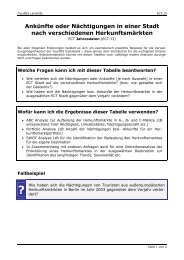European Cities Tourism 1 Proposal for a questionnaire design for ...
European Cities Tourism 1 Proposal for a questionnaire design for ...
European Cities Tourism 1 Proposal for a questionnaire design for ...
You also want an ePaper? Increase the reach of your titles
YUMPU automatically turns print PDFs into web optimized ePapers that Google loves.
<strong>European</strong> <strong>Cities</strong> <strong>Tourism</strong><br />
♦ For all closed questions, if the respondent does not reply or seems puzzled, interviewers should simply repeat the<br />
question word-<strong>for</strong>-word, and say no more. They must not offer any explanations.<br />
♦ For open-ended questions, interviewers should not lead the respondents; they may probe but not prompt. For<br />
example:<br />
”What do you like best about ”Eurocity”?”:<br />
PROBE �<br />
Respondent Answers Probe by Interviewer<br />
1. There’s plenty of things to do. →<br />
2. Well, there are plenty of museums. →<br />
3. There’s a good choice of restaurants. →<br />
4. No.<br />
PROMPT X<br />
Respondent Answers<br />
1. There’s plenty of things to do. →<br />
2. Yes, I suppose so. →<br />
3. Yes.<br />
1. What do you mean by this?<br />
2. Anything else?<br />
3. Fine. Anything else?<br />
Prompt by Interviewer<br />
1. Like lots of visitor attractions <strong>for</strong> instance?<br />
2. And lots of good restaurants?<br />
♦ All instructions on the <strong>questionnaire</strong> must be followed, and questions should be asked in strict order; there<br />
should be no deviation from this.<br />
♦ Non-agency interviewers must also have clear instructions regarding the times they are due to interview, and it<br />
would be advisable to use time sheets.<br />
♦ Interviewers, whether agency or students, must be fully briefed on the survey and the <strong>questionnaire</strong> itself be<strong>for</strong>e<br />
they start the project. You cannot expect good work to be done if you do not give proper instructions in the first<br />
place.<br />
Location of interviews<br />
Interviews should take place in locations where visitors are likely to be concentrated, such as outside major<br />
visitors attractions, in major city squares or plazas, city shopping centres and historic areas of the city. If a city<br />
has a large number of major attractions, interview locations should be rotated so that all the main catchment<br />
areas <strong>for</strong> visitors are covered over the year on a regular basis.Sampling and Fieldwork Schedule<br />
The methodology <strong>for</strong> this type of visitor survey is based on the hypothesis that, at some time during their visit to<br />
a city, a visitor will go to one of the main attractions or a specific location within the city. Consequently, careful<br />
selection of the interview locations is critical to the success of the survey in generating a representative sample<br />
of visitors.<br />
If the appropriate in<strong>for</strong>mation is available from other surveys, it is advisable to set quota targets <strong>for</strong> the sample.<br />
Origin of visitors would be of particular importance, with demographic quotas such as age-group of secondary<br />
importance. Related to this, it will be important to agree whether, at the analysis stage, the survey data is<br />
weighted to reflect these quota targets or left unweighted. Our recommendation would be <strong>for</strong> the data to be<br />
weighted to ensure that the sample is as representative as possible of the population to be covered.<br />
Within a group of people, it is important that some selection procedure is adopted to ensure that one member of<br />
the group, such as the oldest person, does not always volunteer himself or herself to be the respondent.<br />
12



